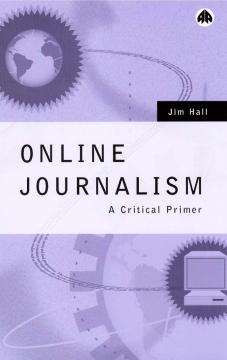
Additional Information
Book Details
Abstract
Online journalism is revolutionising the way news is reported and read. The rise of the internet has forever changed the way audiences interact with the news – stories are posted the moment they break and readers routinely expect to be able to access both the news sources and local perspectives. Online news and the pattern of media ownership raise a number of urgent questions about accuracy, press autonomy, freedom of speech and economic exclusion.
Jim Hall provides a comprehensive guide to the emerging field of cyberjournalism and examines the issues it raises. Looking at how interactive texts are both written and read, the book surveys the new technologies and conventions that online journalism has ushered in. The author uses case studies such as Monicagate and the war in Kosovo to illustrate both the opportunities and the limitations of cyberjournalism.
It is designed as a text to introduce how cyberjournalism works and how it can be used in innovative ways.
Table of Contents
| Section Title | Page | Action | Price |
|---|---|---|---|
| Contents | iii | ||
| Introduction | 1 | ||
| Notes on Usage | 10 | ||
| 1. The Information Society | 13 | ||
| Audiences and Producers in the Information Society | 15 | ||
| New Models of News and Readership | 18 | ||
| A New Medium | 26 | ||
| Shovelware and 'Getting' the Web | 28 | ||
| Content Providers and Aggregators | 32 | ||
| New Audiences | 34 | ||
| Conclusion | 36 | ||
| 2. The Nature of News | 41 | ||
| Impartiality and Objectivity | 43 | ||
| Truth | 47 | ||
| Interactivity | 49 | ||
| Disintermediation | 53 | ||
| 3. From Photosetting to XML | 64 | ||
| Hypertext, New Ways of Writing and Narrative | 66 | ||
| Design and HTML | 72 | ||
| The Virtual Newsroom | 80 | ||
| The Online Journalist | 85 | ||
| 4. Armageddon.com: Home Pages and Refugees | 94 | ||
| News from Open Sources | 96 | ||
| The Allegory of the Good War | 102 | ||
| An Allegory for Kosovo | 105 | ||
| The Virtual Caravelle | 109 | ||
| News from the Front | 112 | ||
| The Information War | 115 | ||
| A Wired Country | 124 | ||
| 5. 'Too Fresh to be True': Acceleration, Ethics and the Spectacle | 128 | ||
| The Spectacularisation of News | 137 | ||
| Myfirsttime.com: the Banalisation of News | 142 | ||
| Journalism Ethics on the Web and the Crisis of Legitimacy | 143 | ||
| The Return of the Real | 150 | ||
| Conclusion | 155 | ||
| 6. 'Undertakings of Great Advantage' | 158 | ||
| The News Online | 162 | ||
| The Free Content Revolution | 169 | ||
| Church and State | 171 | ||
| The Media Oligopoly | 174 | ||
| The Privatisation of the Internet | 177 | ||
| 7. 'That Balance' and the New World Information Order | 185 | ||
| Gatekeepers in the Machine | 188 | ||
| Censorship | 191 | ||
| Privacy and Surveillance | 197 | ||
| Censorship or Constraint | 200 | ||
| Copyright and Intellectual Property | 202 | ||
| The World Information Order | 205 | ||
| 8. The ( Re) construction of Reality: Local and Global Journalisms | 209 | ||
| Global Journalisms | 216 | ||
| The Loss of the Peripheral | 218 | ||
| The Global Information Society and the Media Cartel | 222 | ||
| The Planetary News | 225 | ||
| Conclusion | 228 | ||
| Notes | 231 | ||
| Introduction | 231 | ||
| Chapter 1 | 232 | ||
| Chapter 2 | 233 | ||
| Chapter 3 | 234 | ||
| Chapter 4 | 236 | ||
| Chapter 5 | 238 | ||
| Chapter 6 | 240 | ||
| Chapter 7 | 242 | ||
| Chapter 8 | 245 | ||
| Glossary | 247 | ||
| Bibliography | 254 | ||
| Web | 258 | ||
| Index | 260 | ||
| A.G. 113-15 | 113 | ||
| ABC 134 | 134 | ||
| accuracy | 143 | ||
| 143-4 | 143 |
